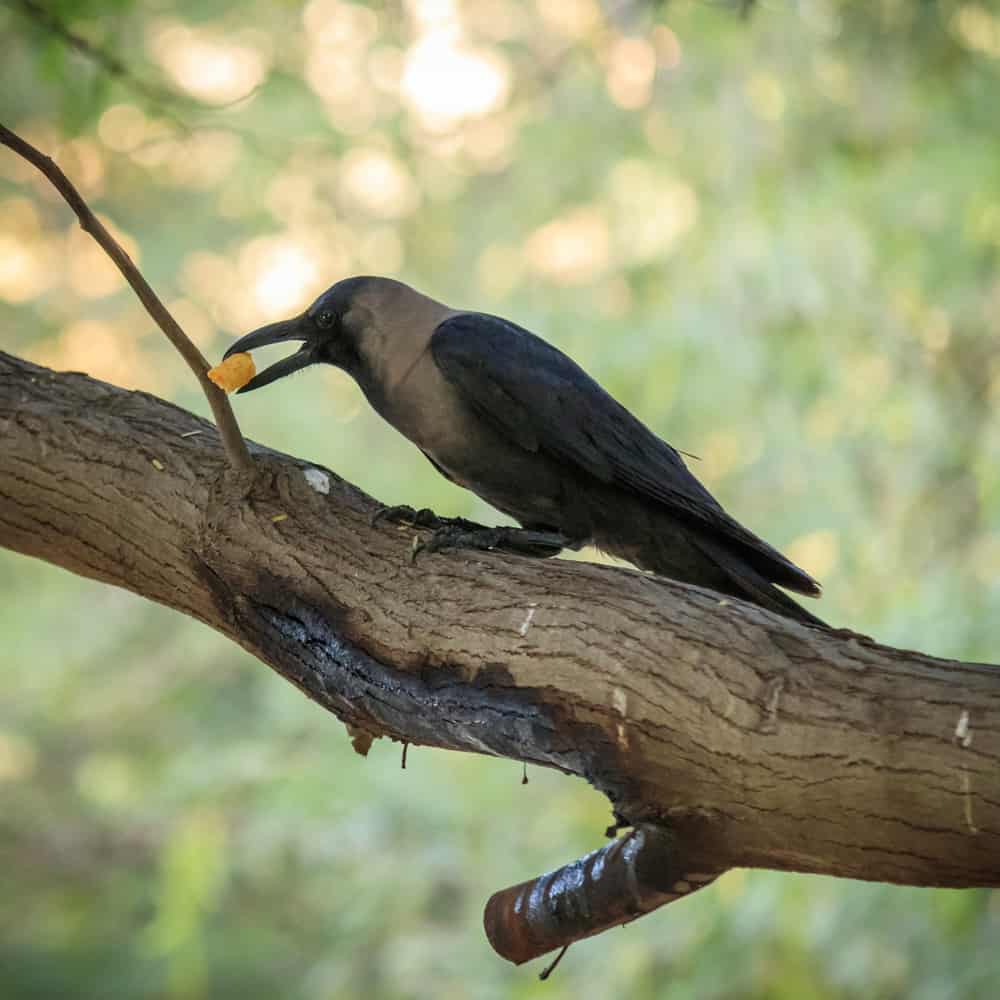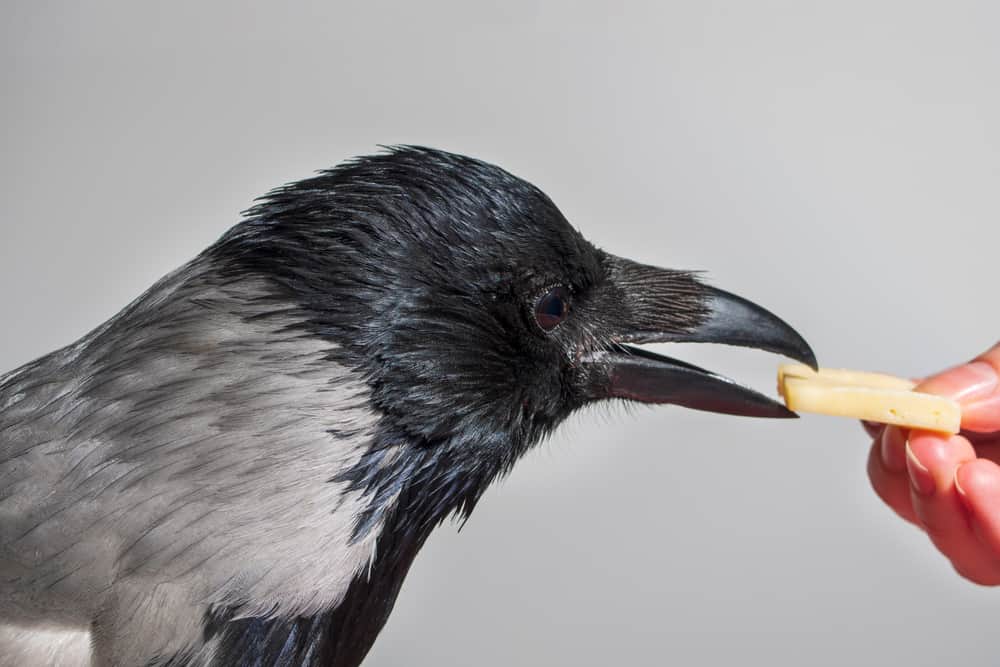What Would Happen if You Were to Feed a Crow Stale Bread
When you hear the "caw" of a crow, what comes to mind? In some cultures, these black-feathered birds are viewed as a bad omen. Research shows that crows are intelligent and social creatures. They thrive in almost any environment, including suburban neighborhoods.
But to survive, what do crows eat?
Crow Habits And Biology
Crows, despite being loud and boisterous, for bird brains, are considered one of the most intelligent animals in the world.
They are famed for their adaptability and are even known, like human beings, to use common sense.
The New Caledonian crow uses sticks in the wild to lure ants out of their nests.
They belong to the genus Corvus along with ravens and rooks and the family Corvidae, which compromises other birds such as magpies, nutcrackers, and jays.
There exist about 40 different species of crows that vary in size, ranging from 24-27 inches (53-69 cm) long. The fish crow measures about 19 inches (48 cm) long, while the American crow measures about 17.5 inches (44 cm) long.
Crow's weight ranges from 12 to 57 ounces (337 -1,625 grams). Some of the most common crow species include:
- The Common Raven
- Carrion crow
- Large-billed Crow
- Rook
- New Caledonian crow

A lot of crows are reclusive, although they often scout for food in groups. An adult needs 11 ounces of food daily for sustenance.
During nesting season, they gather in large numbers to roost and protect themselves from predators. They can eat up to 40,000 grubs a day, including; armyworms, caterpillars, and other insects considered pests.
Others live in groups called "murder." When one of them dies, the murder gathers around to mourn the deceased. Some detective work is done.
Once the crime is solved, they act together to chase the predator away in a behavior known as mobbing.
If you thought it couldn't get any better, think again. Crows have their own language of communication, using over 250 different calls to communicate additional messages. Distress call brings other crows to the aid.
Crows only take up one mating partner for life. They exhibit a variety of breeding and incubation depending on the species. Incubation typically lasts for about 18 days, and the chicks mature at four weeks old.
Crows may live up to 13 years in the wild and up to 20 years in captivity.
What Do Crows Eat Most?
As human beings, crows are omnivores. They consume both plant and animal-kind. Moreover, like humans, they also mind their diets and are particular with what they eat.
The following are delicacies found in the crow "menu".
- Crows love dried pet food, commonly dog or cat food, usually, the small pellet kind that is easier to eat and digest.
- Crows go nuts for nuts—all kinds of nuts; hazelnuts, walnuts, and others.
- Another favorite is hard-boiled eggs. They consider this a real treat and will even devour the egg along with its shell.
- Their love for corn is what has farmers calling them pests.
- Grain is also a delicacy, especially during summer or fall, as it is in plenty and readily available.
- Fruits and berries are also commonly eaten chiefly due to their availability all year round—from grapes to oranges, apples, and blueberries.
- Small reptiles like lizards and geckoes are among crow favorites to cram down. However, they face competition from other predators.
- Amphibians like frogs and salamanders are also found on this long menu as an avian favorite.
- Rodents, including squirrels and mice, are also a fan-favorite among the murder.
- Crows are not biased in feeding and are known to eat almost anything, including carrions (decaying flesh of dead animals).
- Other smaller birds also fall prey to crows as they eat close to anything they get their claws on.
- To avoid the hassle of competing with other predators, crows also feed on various insects such as army ants, mealworms, and other grubs such as caterpillars.
- Species that live in urban and suburban areas like the American crow have it a bit easier as they have access to dumpsters. They rummage through these dumpsters to find disposed foods that suit their fancy and make a meal of it.
- Like the French, snails, among other non-arthropod mollusks, also lie on the menu of these birds of a feather as a delicacy they enjoy.
Evident from the above menu, it's clear that crows have a wide range of meals to choose from daily. For some of these selections, they have to work hard to attain, and for others, they have to be patient, and the food shall avail itself to them.
Crows have peculiar eating behaviors that are unique to them and a few distinct animals like raccoons. Whereby they are known to dip their food into the water before eating. They do this so the food they consume doesn't choke them. Aside from being intelligent, they are classy as well.
Foods to Avoid When Feeding Crows

Crows, like human beings, like to watch what they put in their mouths or in this case, bills.
They are choosey when it comes to eating despite being able to feed on almost anything.
Usually, they behave this way simply because that food doesn't tickle their fancy or may cause them harm.
And it is for that reason, when feeding crows, here are some food items you should exclude from their diets.
- Seeds from peaches, apples, pears and cherries should not be fed to crows as they contain traces of cyanide. When feeding them fruits, it's advisable to remove the seeds beforehand.
- Foods such as uncooked or dried beans should not be fed to them either. They contain toxins that are harmful to crows.
- Crows, like human beings, also get stomach upsets and foods such as mushrooms may also induce liver failure.
- For obvious reasons, alcohol is also not advisable to be given to crows.
- Peppers are among other foods that may cause stomach upsets to crows, with symptoms ranging from diarrhea and or vomiting.
- When feeding crows foods such as nuts, it is advisable to feed them saltless nuts. Why? Because it may cause dehydration to the bird and even possible kidney failure.
- If fed to crows, onions should be given in small amounts as a high intake may result in anemia.
- These birds also experience similar ailments to human beings. Food items rich in sugar such as chocolates may cause vomiting, diarrhea and even seizures, leading to death among this avian family.
The above-listed food items are harmful to the Corvidae family and should not be fed to them at all costs.
In some countries, feeding crows is considered illegal. Hence before partaking in the activity either as a pass time or a hobby, you should first confirm with your local authority.
Tips on Feeding Crows
Feeding crows can be as tricky as feeding a human baby because they tend to be very difficult. As mentioned in other sections of this article, especially when it comes to feeding.
So if you're looking to take up crow feeding as a hobby, consider the below.
- Find out what they like or dislike. You must first ask yourself, "what do crows like?" Through trial and error on your part as the birds can be highly erratic in deciding what they do and don't like.
- You should be able to provide an environment that is conducive for the crows to feed. Preferably, this should be a quiet place they would be comfortable visiting from time to time. Food should be readily available.
- Any indications of threats should be eliminated, such as vehicles and pets that may spook the corvid birds. Noisemakers should be kept at a distance.
- Offer them their favorite treats. Surprise them with some unsalted nuts, seeds or fruits that they very much enjoy.
- Establishing a routine will go to show that you are reliable. These ingenious birds know how to study patterns and are known for their memories. Predictability helps the crows to know when to expect you.
- Adding a birdbath for the crows to dip their food in, have a drink, and cool off after a meal.
- Patience is vital as the birds may take some time before they approach as they are analytical. Test them with different foods if need be until you find something that they like.
You'll know your mission is accomplished because crows eagerly descend on the food they consider to be their favorites.
Summary
Humanity might view them bad luck or as pests or tricksters. But there is no denying the outright intelligence crows possess. Be it their memory, language, or boisterous nature.
Their tendency to adapt quickly and coexist with humankind is unmatched. Crows, you can feed them, but you can't cage them.
Source: https://www.atshq.org/what-do-crows-eat/
0 Response to "What Would Happen if You Were to Feed a Crow Stale Bread"
Post a Comment